Greece heatwave: Warning for tourists after four dead and more missing in record temperatures
The earliest recorded heatwave could be a taste of what is to come for the country expecting record tourism this year, Rich Booth reports from Greece
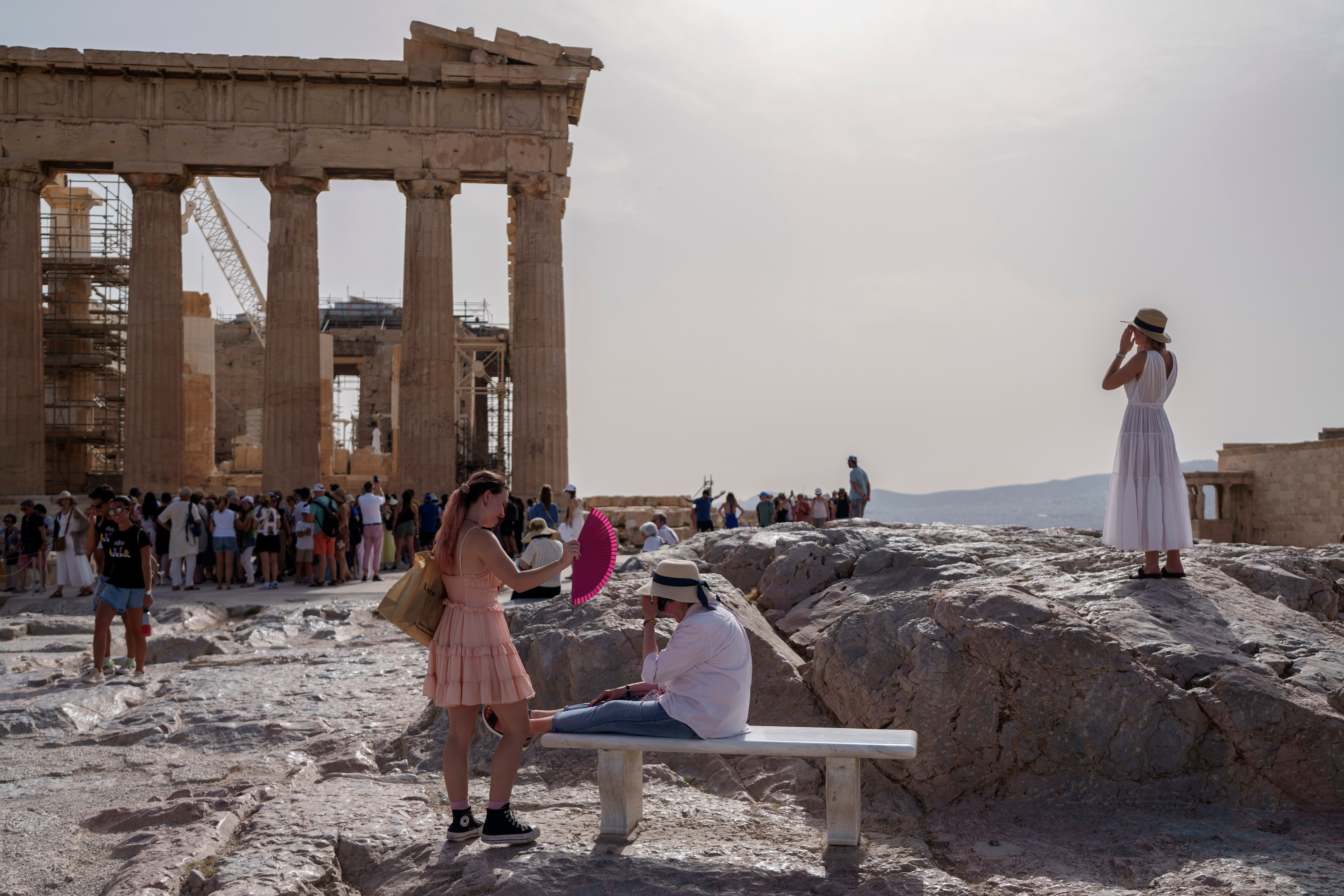
Your support helps us to tell the story
From reproductive rights to climate change to Big Tech, The Independent is on the ground when the story is developing. Whether it's investigating the financials of Elon Musk's pro-Trump PAC or producing our latest documentary, 'The A Word', which shines a light on the American women fighting for reproductive rights, we know how important it is to parse out the facts from the messaging.
At such a critical moment in US history, we need reporters on the ground. Your donation allows us to keep sending journalists to speak to both sides of the story.
The Independent is trusted by Americans across the entire political spectrum. And unlike many other quality news outlets, we choose not to lock Americans out of our reporting and analysis with paywalls. We believe quality journalism should be available to everyone, paid for by those who can afford it.
Your support makes all the difference.Greece is counting the cost of an early heatwave that has taken the lives of several tourists in a preview of the extreme weather it is likely to face this summer.
An urgent warning has been issued to anyone travelling to the country as four holidaymakers have died and more are missing amid record temperatures.
A favourite holiday destination for much of Europe, Greece has now been hit by the earliest heatwave on record. A heatwave is classed as temperatures exceeding 38C for at least three days.
Click here for our latest updates on the search for missing tourists
Tourist sites in sweltering Athens and beyond were forced to close on Wednesday and Thursday. The Acropolis shut its doors to visitors after reports of people fainting while waiting in line. Greek authorities issued a level three heat alert, sending automated warnings to phones that urged people to work from home and avoid strenuous outdoor activities.
Greek state TV meteorologist Panos Giannopoulos said the country has seen its earliest reported heatwave: “In the 20th century we never had a heatwave before 19 June. We have had several in the 21st century, but none before 15 June.”
Chania, a city on the northwest coast of Crete recorded the highest temperature, with the mercury reaching 44.5C on Thursday. The area was also hit by a 3.7 magnitude earthquake on Friday morning.
The heat, twinned with an earlier season than usual, has left several tourists dead, even before the high period starts.
The spike in heat comes in the same week that TV doctor Michael Mosley was found dead on the island of Symi in the Dodecanese island group close to Rhodes. He collapsed during a walk.
The Trust Me, I’m a Doctor presenter, 67, was found dead on Sunday, four days after he went missing. His wife said he took the wrong route on what was supposed to be a short walk to the next town.
The path would have taken him over or alongside a steep slope littered with rocks and no shelter from the heat that hit 37C. It is estimated that his time of death was around 4pm local time on Wednesday. He had left friends on the island’s Agios Nikolaos beach at around 1.30pm to go for a walk.
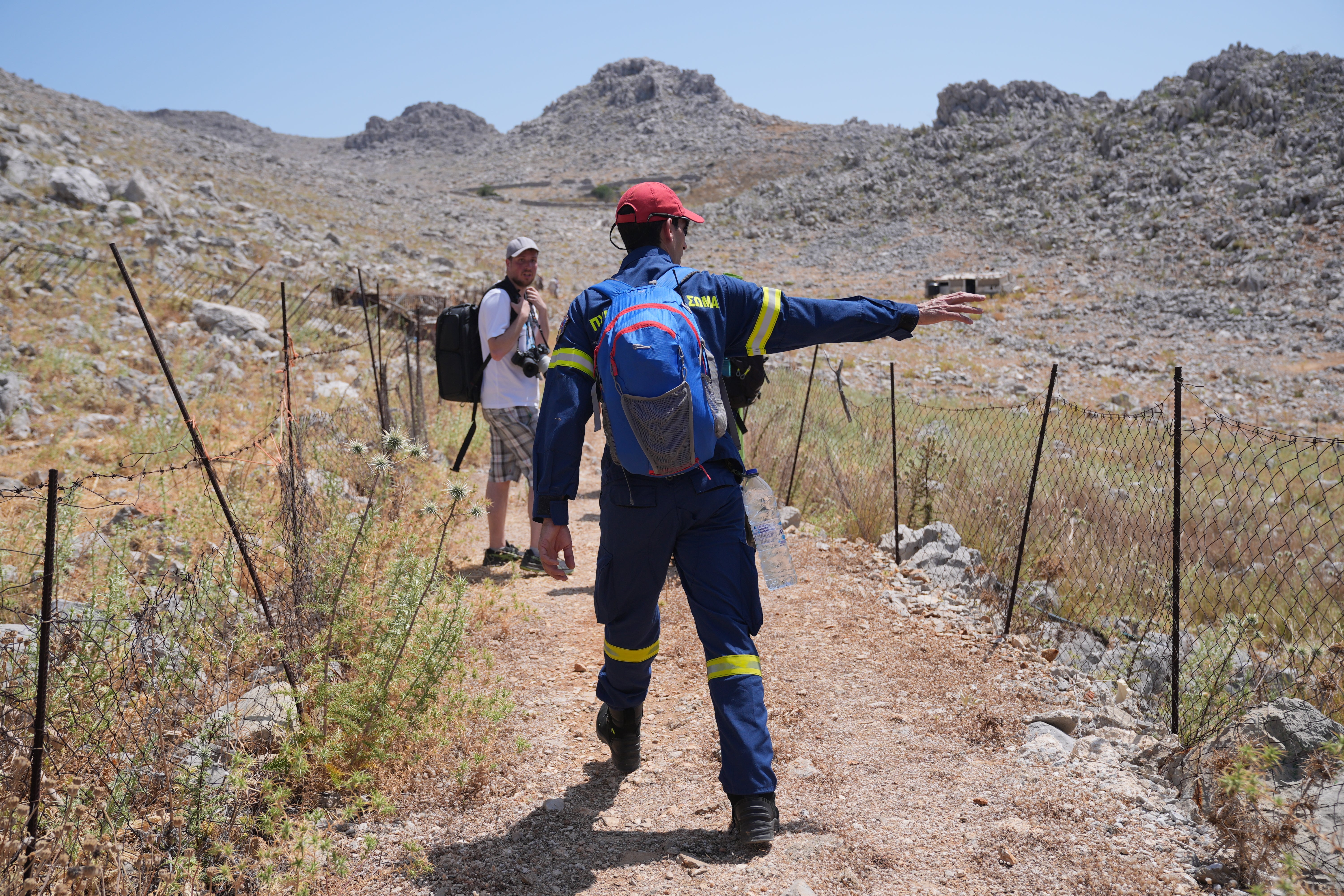
Elsewhere in Greece, a 67-year-old Dutch tourist was found dead in Crete on 5 June. The man collapsed while crossing the Mylon gorge in Rethymno. The fire service confirmed the death on social media and local media reported he suffered heart failure in the heat.
On the same day, local media reported a 70-year-old French tourist collapsed and died while walking on a beach in Sitia, Crete.
A fourth tourist death was reported on Thursday 13 June, again on Crete. An 80-year-old man had left his hotel on his own and was found dead near an archaeological site near the northeast town of Malia.
Search teams in Greece are still looking for three other missing tourists in separate incidents.
Retired US police officer Eric Calibet disappeared while out on a solo hike on the island of Amorgos in the southeast of the country on Tuesday afternoon. Mr Calibet, 59, knew the area well having been visiting the island almost every year for about a decade.
He left for a four-hour hike, from Aegiali to Katapola around 7am.
"We’re almost on three days here," his brother Oliver Calibet told Fox 11 TV in Los Angeles. "There’s no water… I’m very distraught."
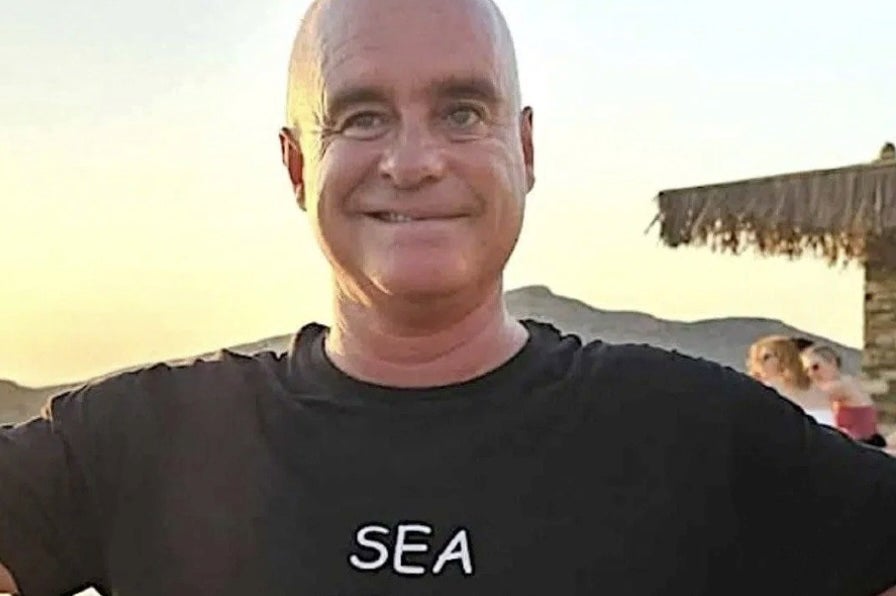
Another American tourist is also missing on the small island of Mathraki, just off Corfu. The 55-year-old tourist hasn’t been seen since Tuesday 11 June, according to local media.
On the island of Samos, a 74-year-old Dutch tourist disappeared while hiking on Sunday. Rescue teams on the tourist island in the eastern Aegean sea said the man vanished in the area of Marathokampos.
Searches for all three are still ongoing.
Dimitris Katatzis, head of the Samos rescue team, said tourists are unaware of the risks they face walking in the heat. Saying they often “veer off track” to see sites and then get lost. “We saw a couple [of foreigners] walking a trail in 41C without hats,” he told local media. “It defies logic.”
Dr Mohit Mandiratta, resident GP on BBC Breakfast, has warned of the complications even the healthiest people can face in the heat. He told The Independent: “Heat can affect anyone, including fit and healthy people, and be very serious if not treated immediately.
“It can come on quickly, over minutes, or gradually over hours, so it’s important we all stay alert to symptoms.”
Heatstroke is a life-threatening condition that occurs when your core body temperature reaches 40C or higher and must be treated immediately.
Common symptoms of heat exhaustion
What to look out for
Common symptoms of heat exhaustion include:
· A headache
· Dizziness and confusion
· Loss of appetite and feeling sick
· Excessive sweating and pale, clammy skin
· Cramps in the arms, legs and stomach
· Fast breathing or pulse
· A high temperature of 38C or above
· Extreme thirst
Dr Mohit Mandiratta, a local GP in the Black Country, added: “To help prevent heat exhaustion drink plenty of cold drinks, take cool baths or showers and wear light-coloured and loose clothing. Try to stay out of the sun between 11am-3pm.
“If someone has heat exhaustion, move them to a cool place and get them to lie down with their feet raised slightly. Ensure they drink plenty of water and cool their skin with cold water and fan them. They should start to cool down and feel better within 30 minutes.
“If someone with heat exhaustion does not improve after 30 minutes, they may have heatstroke. You should call emergency services if they still feel unwell after drinking plenty of water.”
Radek Nowak, active product manager for Intrepid Travel – an agency that specialises in walking holidays, said they have had to adapt trips according to the heat: “The soaring summer temperatures in Europe are certainly making it more challenging for people to do more active holidays.”
Intrepid no longer runs hiking trips in Spain and Portugal during the hottest months of July and August. Winter trips have been added instead in countries such as Greece and Croatia.
Radek added: “When groups are doing walks or hikes in the warm weather, we plan our days around the weather, heading out early in the morning before the heat reaches its peak.”
On the frontline of climate change
Greece is on the frontline in the world’s battle against climate change, being hit by extreme heat and flooding in the space of just a few weeks last year. It recorded its longest heatwave on record, lasting 16 days, in July 2023. The high temperatures fuelled wildfires across the country that saw locals and tourists evacuated.
The minister responsible for civil protection, Vassilis Kikilias, said the last week has posed a particular wildfire risk due to the combination of high temperatures and winds. “The early start of the heatwaves, combined with the dry winter, has led to a very difficult fire season,” he said.
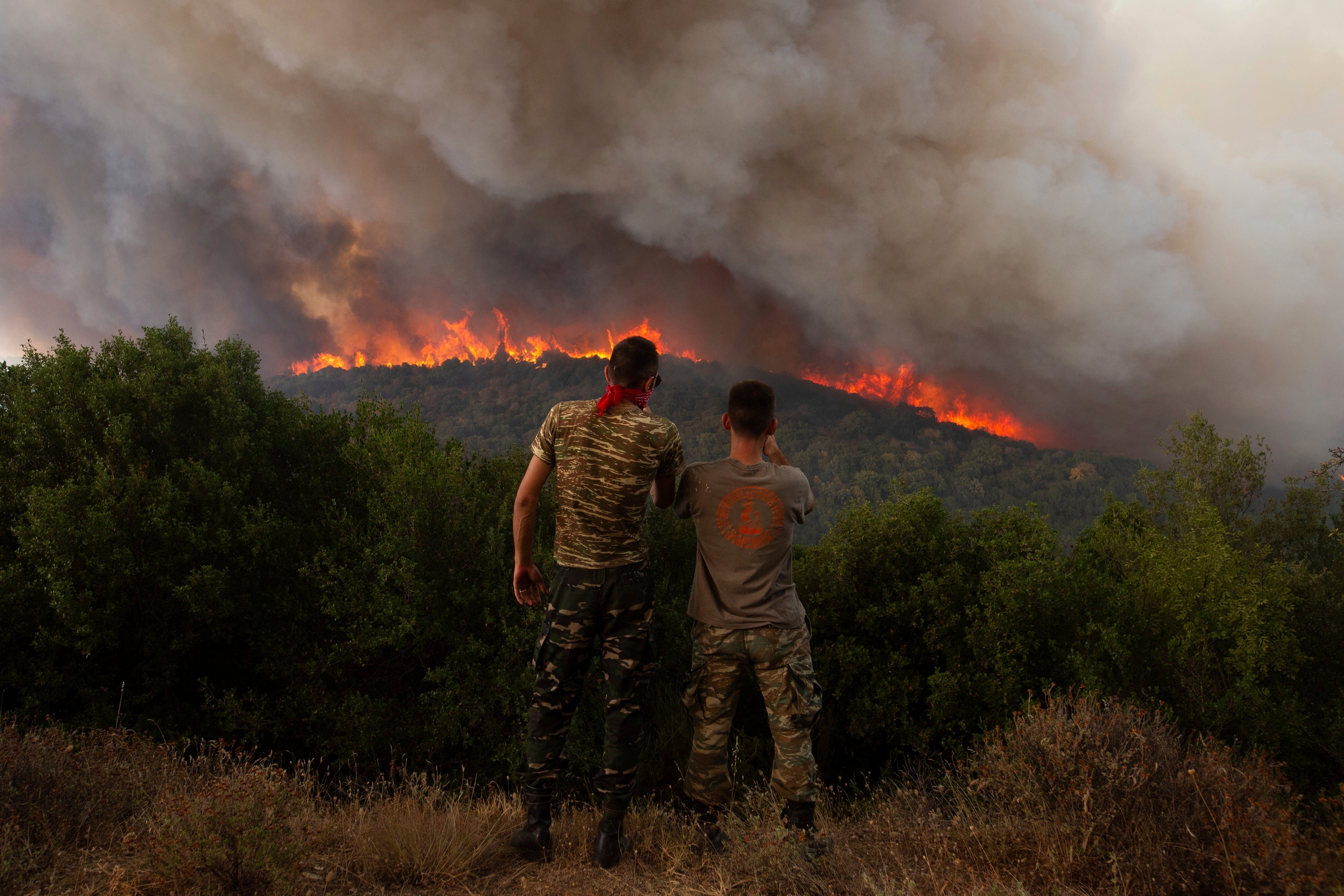
A total of 44 agricultural fires were reported by the fire service on Thursday alone. None are believed to be serious at this point.
As well as record temperatures, Greece is expected to see record tourism this year. In a forecast published days before the heatwave, the National Bank of Greece said tourism is up 24 per cent in the first quarter of the year compared to the same period a year earlier. The analysts said a 20 per cent rise in international arrivals in spring suggests the country will face a longer season than expected.
On Thursday, the Greek ombudsman issued a separate report warning that the country needs to see urgent changes if it wants to see continued growth in tourism. It warned of the growing environmental risks and called for urgent reform.
It said the country needs to reduce rampant construction and protect water resources and coastal areas if it wants to maintain a healthy tourism industry across its mountainous mainland and beach-lined islands.
“Our country’s economy relies heavily on tourism which makes the need to manage it in a sustainable way even more urgent,” the report said.
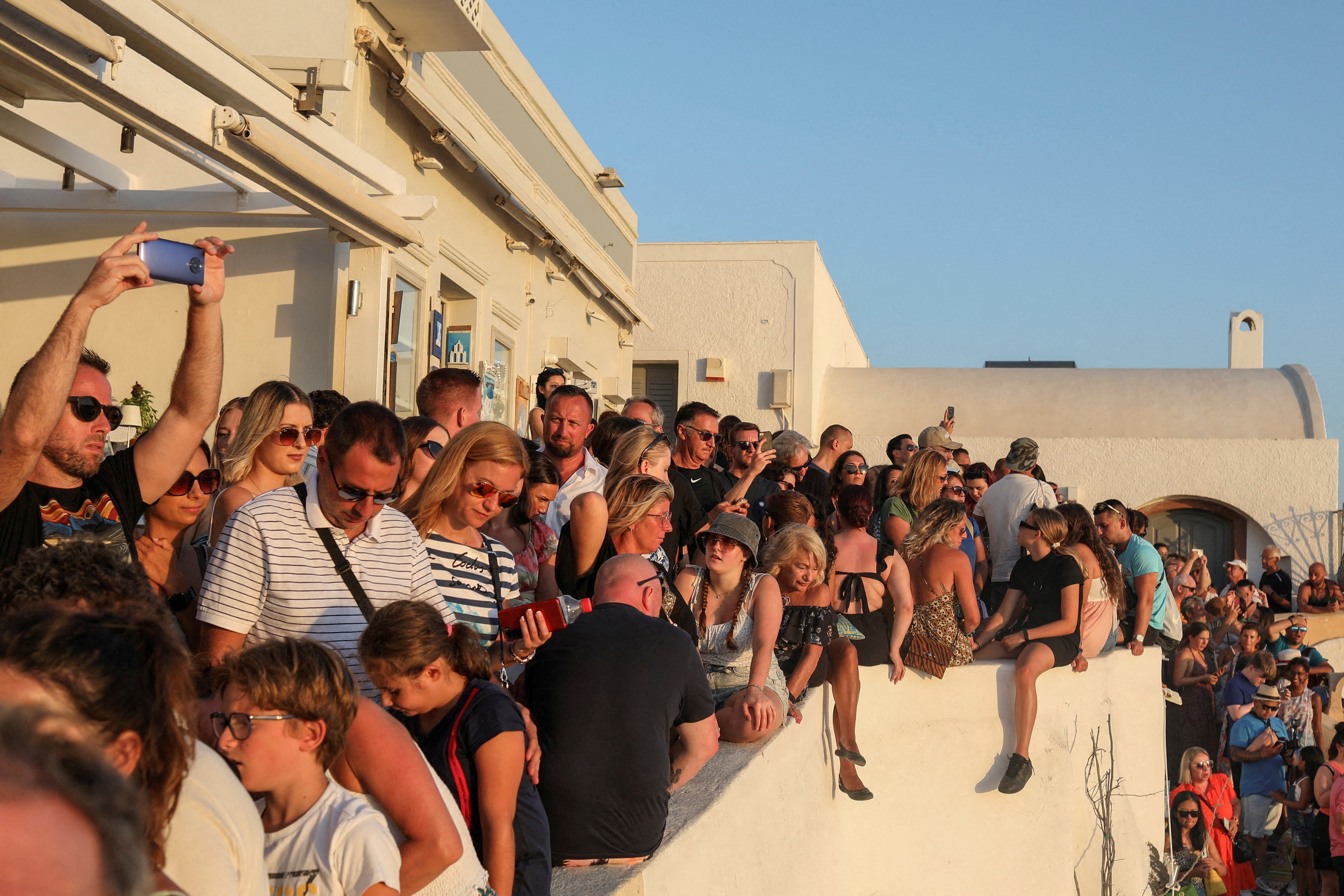
Overtourism is an issue in Greece, as it is in other holiday hotspots across Europe. The ombudsman report said that Santorini – a small island in the Aegean Sea with 15,550 residents – receives more than 5.5 million visitors annually, twice the number it hosted in 2012. “In Santorini, even tourists complain about the great number of tourists,” it added.
On Friday, prime minister Kyriakos Mitsotakis said in an interview with Bloomberg that the government is also considering imposing a cap on the number of cruise ships visiting the most popular tourist islands.
Infrastructure
The infrastructure of the country is struggling to keep up with the temperatures.
The heat not only closed tourist attractions this week but schools across the country were forced to shut their doors just days before the start of the three-month-long break.
Greek schoolchildren are given three months off for summer. With temperatures rising, the holidays start in the middle of June and the next team starts again in the middle of September.
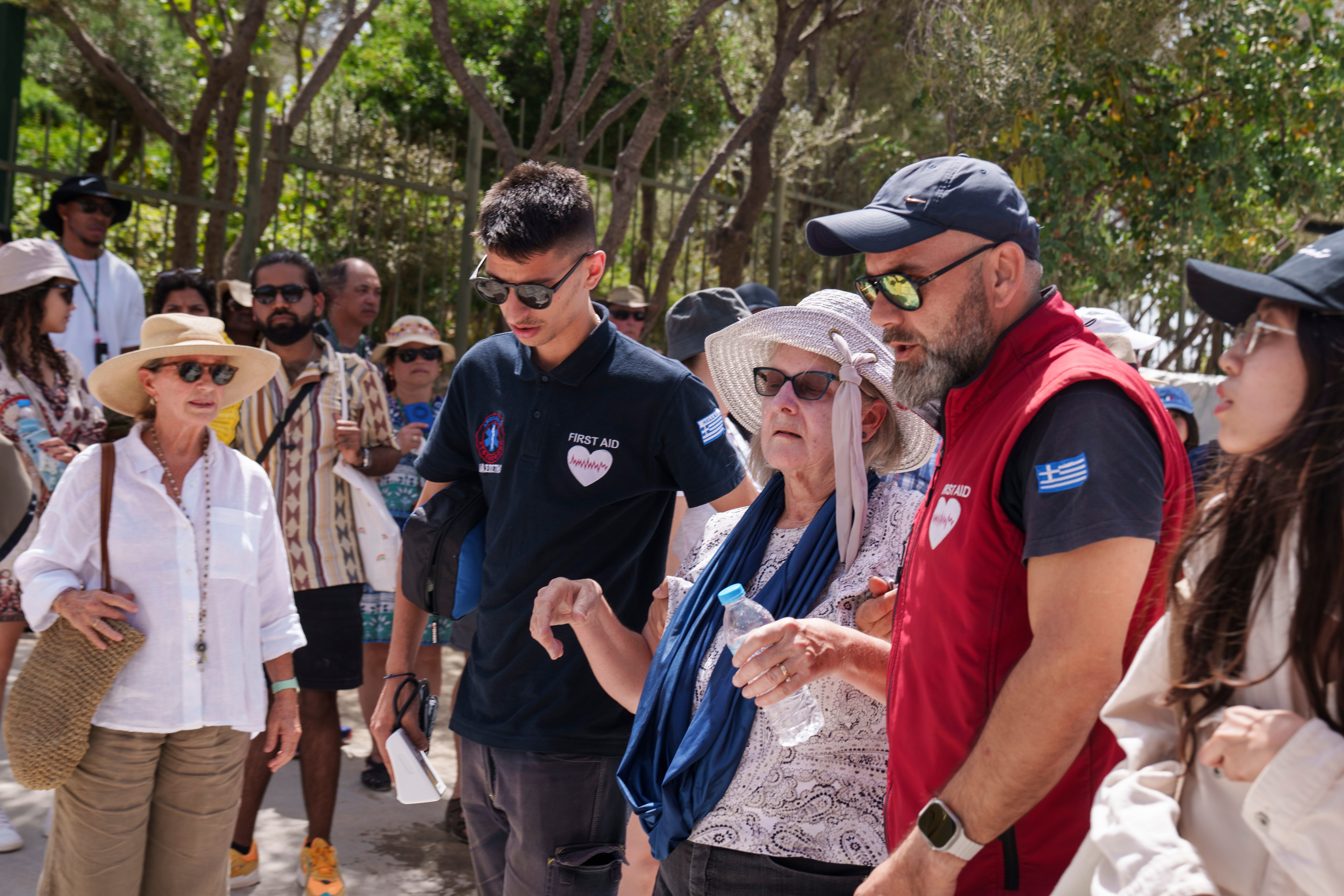
Despite schools being closed for lessons other students were forced to sit Panhellenic exams, the equivalent to A-levels, during the heatwave – many in poorly air-conditioned rooms. Parents in Athens and on the island of Thessaloniki were asked to bring fans when they dropped their children off for exams.
Workers in Athens were told to avoid activity between midday and 5pm and elderly people and those with chronic ailments were told to stay indoors.
At Athens airport, passengers on a Qatar Airways flight to Doha were forced to wait hours on board due to a technical problem. Passengers reportedly fainted due to a lack of air conditioning.
On Wednesday a huge fire broke out at a cookware factory in the Athens suburb of Kifisia. A warning of toxic smoke was sent to those living nearby, adding that they should shut their windows.
What next?
Temperatures across the country began to ease on Friday, with forecasters saying the heat will return to average for this time of year at 31 to 33 degrees.
The Foreign Office has said travellers heading to Greece should “be cautious if you are in or near an area affected by wildfires”.
They added that tourists should:
- follow the guidance of the emergency services
- call the Greek Emergency Services on 112 if you are in immediate danger
- contact your airline or travel operator who can assist you with return travel to the UK
Join our commenting forum
Join thought-provoking conversations, follow other Independent readers and see their replies
Comments